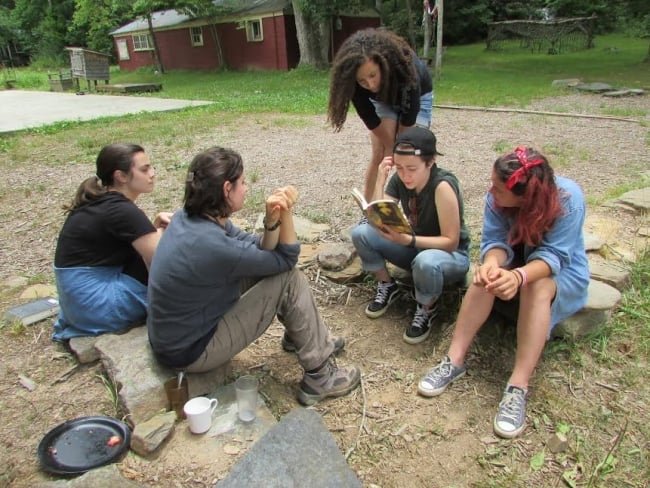You have /5 articles left.
Sign up for a free account or log in.

Students at the Arete Project
Courtesy of Laura Marcus
Deep Springs College in California is well-known as one of the few remaining all-men’s colleges in the country. While the college's leaders want to admit women, a handful of alumni have gone to court over the shift, delaying any change. While the legal drama plays out, an alternative program for women has sprung up on the other side of the country.
The Arete Project, an all-women summer program run by two former Deep Springs employees, is now in its second summer. Young and rapidly expanding, its directors are considering launching sessions during the school year, and the option of a second coeducational program is also being weighed. If the coed program is begun, it would be an option for students interested in a unique program like that at Deep Springs or Arete, but unwilling to commit to a full education at a single-gender institution.
“Arete” is an ancient Greek term meaning “excellence” or “virtue of character,” and taken by the founders of the project to mean the “best we can be,” according to the project's website.
Laura Marcus, the executive director of the Arete Project and a former staffer at Deep Springs, said she and a Deep Springs alumnus, John Moriarty, began planning the new program a few years ago, but paused their ambitions when the college announced that it would admit women.
But a court order blocked the admissioin of women at Deep Springs, and Marcus and Moriarty scrambled to pull together the Arete Project, hosting it on a rented farm in California during its inaugural year before moving to North Carolina, and basing it off the basic principles of Deep Springs.
The 16 women in the program, who come from top institutions such as Yale University, Amherst College and Middlebury College, spend eight weeks isolated on a farm. Their mornings are dedicated to the upkeep of the land before they attended an intensive humanities seminar in the afternoon and spend their nights voting on self-governance issues, which range from whether or not the program should become coed to whether the use of overused phrases like “the notion of” should be limited while at the project.
Tuition for the program only totals about $500 -- costs are kept low thanks to what Marcus described as her “skills in fund-raising and development” -- and tuition assistance is available for anyone who applies. College credit can be earned through the course.
Marcus said the decision to keep the project open only to women was made by the first group of participants early on in their time at the project and gives interested women an opportunity to be involved in an experience that is inaccessible elsewhere.
“The only other experience is Deep Springs, so to have half of our slots also go to men defeats the purpose of aiming for a whisper of equity in the way those places were distributed,” Marcus said.
She said for many participants, it’s the first time they’re in a space made up of only one gender and offers a new kind of community where women can speak out and take on leadership roles without feeling marginalized. (While a few participants have come from women's colleges, all so far have been graduates of coeducational high schools.)
Marcus said that while she would like to see Deep Springs go coed, she acknowledged that by removing the single-gender requirement does take away some of the benefits of the program, like allowing voices that might otherwise not be heard to speak out and creating a stronger sense of community.
“Both men- and women-only spaces give students an ability and a space to explore questions of gender and how that is tied into social practices,” Marcus said.
Caroline Tracey, who attended the Arete Project during its first summer, said she had heard of Deep Springs during high school and wanted to attend the college, but wasn’t able to because of the gender requirement.
Tracey, who is now completing her time as a Fulbright scholar in Kyrgyzstan, is also a member of Arete’s steering committee, helping to make decisions on the future of the program, including its expansions, although she said her involvement is more limited than that of other committee members.
She said that by living so closely with a group of women, she learned the importance of creating a strong community and making sure each member of the project felt valued. However, she noted that the projects' participants were of the same mold as many of her classmates at Yale.
“You start not to want to speak poorly of anyone and rather be understanding of all types of people because you see all different aspects of them in class and sleeping in the same room,” Tracey said.
David Neidorf, the president of Deep Springs, said he has “no doubt” that the institution will become coed in the next five years, once all legal hurdles have been cleared -- alumni of the school have fought back against opening the small and competitive institution to both genders, saying that the single-gender experience was important to their time at Deep Springs.
Neidorf said that while this may be the case at some women’s colleges, at Deep Springs having both genders wouldn’t make that much of a difference because of the high caliber of candidates who apply to the college and the standards students are held to on campus.
“That experience is not the goal or the venture or the purpose of the college,” he said. “Most people say the college is effective for them because of the broad experience, because of their own ability to be responsible for a community. That’s much more important than taking a small subset of people that maybe need gender sheltering.”
He said that while the college has no formal affiliation with the Arete Project, he was supportive of any program that would allow more students to have an experience similar to that at Deep Springs, and would not oppose other programs adopting the model as well.
Kim Bobby, the director of the Inclusive Excellence Group at the American Council on Education, said when women interact with only other members of their gender, they can tackle issues that only impact their gender without having to worry about being inclusive to outside groups.
She said that among women there are so many subgroups with their own concerns that by isolating for gender, those groups can speak out and try to more easily find solutions.
“I think it’s fielding a certain kind of need for our population,” Bobby said of the Arete Project. “It’s important for us to be able to have the choices, for students to come to a campus where they can flourish in all intersectionalities of identity.”








